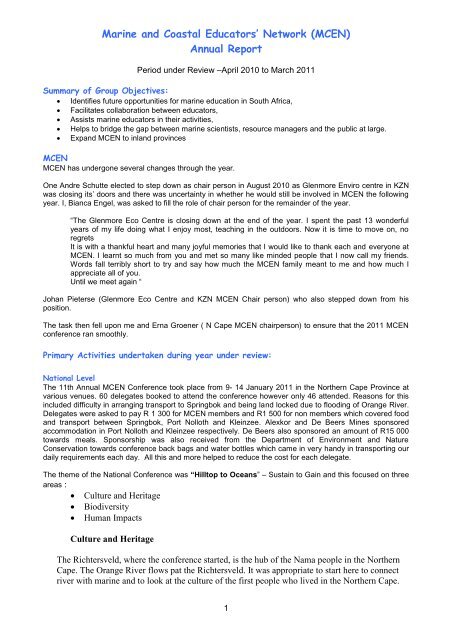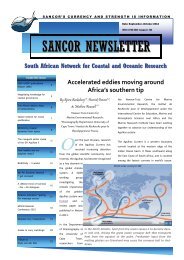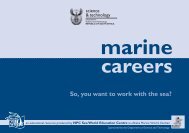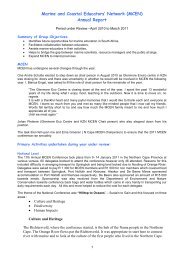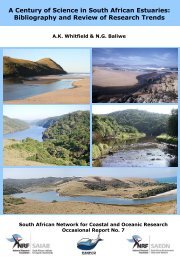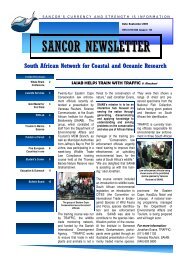Marine and Coastal Educators' Network (MCEN) Annual ... - Sancor
Marine and Coastal Educators' Network (MCEN) Annual ... - Sancor
Marine and Coastal Educators' Network (MCEN) Annual ... - Sancor
Create successful ePaper yourself
Turn your PDF publications into a flip-book with our unique Google optimized e-Paper software.
<strong>Marine</strong> <strong>and</strong> <strong>Coastal</strong> Educators’ <strong>Network</strong> (<strong>MCEN</strong>)<br />
<strong>Annual</strong> Report<br />
Period under Review –April 2010 to March 2011<br />
Summary of Group Objectives:<br />
� Identifies future opportunities for marine education in South Africa,<br />
� Facilitates collaboration between educators,<br />
� Assists marine educators in their activities,<br />
� Helps to bridge the gap between marine scientists, resource managers <strong>and</strong> the public at large.<br />
� Exp<strong>and</strong> <strong>MCEN</strong> to inl<strong>and</strong> provinces<br />
<strong>MCEN</strong><br />
<strong>MCEN</strong> has undergone several changes through the year.<br />
One Andre Schutte elected to step down as chair person in August 2010 as Glenmore Enviro centre in KZN<br />
was closing its’ doors <strong>and</strong> there was uncertainty in whether he would still be involved in <strong>MCEN</strong> the following<br />
year. I, Bianca Engel, was asked to fill the role of chair person for the remainder of the year.<br />
“The Glenmore Eco Centre is closing down at the end of the year. I spent the past 13 wonderful<br />
years of my life doing what I enjoy most, teaching in the outdoors. Now it is time to move on, no<br />
regrets<br />
It is with a thankful heart <strong>and</strong> many joyful memories that I would like to thank each <strong>and</strong> everyone at<br />
<strong>MCEN</strong>. I learnt so much from you <strong>and</strong> met so many like minded people that I now call my friends.<br />
Words fall terribly short to try <strong>and</strong> say how much the <strong>MCEN</strong> family meant to me <strong>and</strong> how much I<br />
appreciate all of you.<br />
Until we meet again “<br />
Johan Pieterse (Glenmore Eco Centre <strong>and</strong> KZN <strong>MCEN</strong> Chair person) who also stepped down from his<br />
position.<br />
The task then fell upon me <strong>and</strong> Erna Groener ( N Cape <strong>MCEN</strong> chairperson) to ensure that the 2011 <strong>MCEN</strong><br />
conference ran smoothly.<br />
Primary Activities undertaken during year under review:<br />
National Level<br />
The 11th <strong>Annual</strong> <strong>MCEN</strong> Conference took place from 9- 14 January 2011 in the Northern Cape Province at<br />
various venues. 60 delegates booked to attend the conference however only 46 attended. Reasons for this<br />
included difficulty in arranging transport to Springbok <strong>and</strong> being l<strong>and</strong> locked due to flooding of Orange River.<br />
Delegates were asked to pay R 1 300 for <strong>MCEN</strong> members <strong>and</strong> R1 500 for non members which covered food<br />
<strong>and</strong> transport between Springbok, Port Nolloth <strong>and</strong> Kleinzee. Alexkor <strong>and</strong> De Beers Mines sponsored<br />
accommodation in Port Nolloth <strong>and</strong> Kleinzee respectively. De Beers also sponsored an amount of R15 000<br />
towards meals. Sponsorship was also received from the Department of Environment <strong>and</strong> Nature<br />
Conservation towards conference back bags <strong>and</strong> water bottles which came in very h<strong>and</strong>y in transporting our<br />
daily requirements each day. All this <strong>and</strong> more helped to reduce the cost for each delegate.<br />
The theme of the National Conference was “Hilltop to Oceans” – Sustain to Gain <strong>and</strong> this focused on three<br />
areas :<br />
� Culture <strong>and</strong> Heritage<br />
� Biodiversity<br />
� Human Impacts<br />
Culture <strong>and</strong> Heritage<br />
The Richtersveld, where the conference started, is the hub of the Nama people in the Northern<br />
Cape. The Orange River flows pat the Richtersveld. It was appropriate to start here to connect<br />
river with marine <strong>and</strong> to look at the culture of the first people who lived in the Northern Cape.<br />
1
The first stop was at Cornellskop where the “Wondergat” is situated. The “Wondergat” is a deep<br />
<strong>and</strong> mysterious sinkhole where, according to the locals, people disappear or return to the surface<br />
suddenly aged, with wide open terrified eyes <strong>and</strong> grey hair.<br />
The Nama culture was introduced to the participants through :<br />
� A Nama interview – to learn about certain practices <strong>and</strong> to hear the dialect of the Nama<br />
language;<br />
� The Nama dance – which had some modern dances intertwined to make the Nama dance<br />
more acceptable to the youth after which participants were taught how to do the dance;<br />
� A Nama song was also taught to the participants;<br />
� A visit to the petroglyphs were paid, which is San rock engravings. The San people<br />
chipped these engravings on the black dolomite rocks <strong>and</strong> that the majority date back at<br />
least 2 000 years. Each participant got the opportunity to paint his/her own Nama<br />
painting on stone with partly traditional paint.<br />
The final activity for the day was the “pot brood” competition, where each group mixed <strong>and</strong> kneed<br />
their own dough. “Pot-brood” forms, up to today, an important part of the Nama culture.<br />
Biodiversity<br />
The Richtersveld is a Succulent Karoo Biodiversity Hotspot which is an ecosystem with an<br />
astounding 4849 succulent plants, 40% of which are found nowhere else in the word. Attention<br />
was given to the quiver tree during the visit to Cornellskop.<br />
A presentation of the lichen hill, which is visible from the road 5 km outside Alex<strong>and</strong>er Bay, was<br />
given in Alex<strong>and</strong>er Bay.<br />
The Lichen Hill in Alex<strong>and</strong>er Bay is an example of the unique plant adaptations to the arid climate<br />
of the Richtersveld. This orange coloured lichen hill is the only one of its kind in the country. The<br />
Eco-School in Alex<strong>and</strong>er Bay adopted this most sensitive site <strong>and</strong> is in the process of putting plans<br />
in place to protect this site.<br />
The Orange River Mouth was designated on 28 th June 1991as a RAMSAR site. The estuary<br />
provides a suitable habitat for as many as 20 000 to 26 000 individual birds. Of the 57 wetl<strong>and</strong><br />
species recorded, 14 are listed as either rare or endangered in one or both of the South African <strong>and</strong><br />
Namibian Red Data Books. In 1995 the site was placed on the Montreux Record of the Ramsar<br />
Convention following the collapse of the salt marsh component of the system, which was the result<br />
of a combination of impacts, both at <strong>and</strong> upstream of the wetl<strong>and</strong>. Rehabilitating efforts are<br />
currently in progress. This information, amongst others, was included in a h<strong>and</strong>-out <strong>and</strong> a short<br />
informal presentation at the Orange River Mouth.<br />
Delegates were also able to appreciate the impact flooding has on these areas as this presentations<br />
occurred a few days before the flood water reached these areas <strong>and</strong> 3 days later as we were shown<br />
the same area we had visited previously.<br />
A most amazing DVD with a presentation, on the unique biodiversity along the coastline of<br />
Namaqual<strong>and</strong>, was conducted by Annelise Le Roux from Cape Nature. Some of these fauna <strong>and</strong><br />
flora are only found in Namaqual<strong>and</strong>.<br />
The Kleinzee Cape Fur Seal colony, which we visited on Wednesday, 12 th January 2011, hosts<br />
almost 450 000 animals which makes it the largest on-l<strong>and</strong> colony in South Africa. This colony is<br />
protected by the adjacent mining area.<br />
2
In addition to looking at the unique biodiversity of this area we also were able to see firsth<strong>and</strong> the<br />
impact human activities have had on this region. The Namaqua coast line is known for the diamond<br />
mining by mainly Alexkor in Alex<strong>and</strong>er Bay <strong>and</strong> De Beers Mines in Kleinzee.<br />
Part of the conference programme was 2 mine tours at Alexkor <strong>and</strong> De Beers Mines respectively.<br />
The reason for the mine tours was to observe the impacts that mining has on the natural<br />
environment <strong>and</strong> the successes of the rehabilitation programmes that are implemented by both<br />
mines.<br />
The conference always gives an opportunity to share information <strong>and</strong> ideas. This conference was no<br />
exception <strong>and</strong> the following most informative presentations/lessons were given by delegates from<br />
other provinces, (Table 1):<br />
Table 1: Presentations<br />
Presentation/Activity Presenter Organization<br />
Plastics John Kieser Plastics Federation of SA<br />
Cape Town<br />
Who dirtied the water Portia Lephaila Sea World @ Ushaka<br />
<strong>Marine</strong> - Durban<br />
Rocky shores Rolf Collins Ocean Vision- Cape Town<br />
Introduction to biomimicry using<br />
aquarium animals<br />
Xavier Zylstra Ocean Vision- Cape Town<br />
Teaching inl<strong>and</strong> learners about Justice Bilankulu National Zoological<br />
marine life<br />
Gardens -Pretoria<br />
H<strong>and</strong>s-on activity Sustainable Nicci Hoal Centre for Conservation<br />
Angling<br />
Education – Cape Town<br />
3 R’s through the medium of birds Weston Barwise SANCCOB<br />
To shell or not to shell Bianca Engel Two Oceans Aquarium<br />
After the short 4x4 drive to the mouth <strong>and</strong> the informal presentation canoeing was done in the<br />
Orange River Mouth. This was quite an experience for many first timers.<br />
On the 12 th January 2011 at Kleinzee participants were divided into two groups <strong>and</strong> while the one<br />
group experienced a Northern Cape dune surfing the other group played a marine quiz which is an<br />
effective <strong>and</strong> fun way of transferring information <strong>and</strong> is suitable for both adults <strong>and</strong> learners.<br />
The Gala Evening was the highlight of the conference <strong>and</strong> marked the official closure of the 11 th<br />
National <strong>MCEN</strong> Conference. The special guests, who attended, were:<br />
� Ms. Miriam Phaliso, Member of Parliament, who delivered the keynote address;<br />
� Delegation of De Beers Mines;<br />
� District Director <strong>and</strong> Deputy Director from Department of Education in Namaqual<strong>and</strong>.<br />
A short programme, consisted of a word from the National Chairperson, a keynote address <strong>and</strong><br />
the h<strong>and</strong>ing over of certificates to the conference participants, was part of the evening’s event.<br />
All of the delegates including myself came away from the conference with a clearer<br />
underst<strong>and</strong>ing of the environment in this province, <strong>and</strong> the challenges facing <strong>Marine</strong> <strong>and</strong> coastal<br />
educators in this area one including the distances that are travelled on a daily basis.<br />
3
Membership<br />
We currently have approximately 60 members in <strong>MCEN</strong>; this includes individuals as well as organizations<br />
Steering Committee Meetings<br />
A telephone conference Steering Committee Meeting was held on 28 August 2009 to reduce travelling costs.<br />
This worked well <strong>and</strong> several important matters were under review.<br />
A Second National telephone conference Steering Committee Meeting is to be held on the 16 th February as<br />
we did not have a quorum to continue with the meeting at the 2011 conference in the Northern Cape.<br />
Regional Level<br />
During the period under review, the following activities took place:<br />
Western Cape<br />
The Western Cape <strong>MCEN</strong> had its midyear conference on the 12 th - 13 th August at Soetwater Enviro camp.<br />
The conference was held over two days <strong>and</strong> delegates had the option of sleeping over instead of commuting<br />
in every day.<br />
The Theme of the conference followed on from the IUCN year of Biodiversity the previous year <strong>and</strong> focused<br />
on <strong>Marine</strong> Biodiversity in South Africa. Approximately 64 delegates attended overall.<br />
Of significance was the attendance of a number of Life Sciences educators from high schools, primary<br />
schools <strong>and</strong> teachers from the Educare sector. The tertiary education institutions were there too, from the<br />
University of the Western Cape (UWC) <strong>and</strong> Cape Peninsula University of Technology (CPUT).<br />
Iziko Museums sent a large delegation, DAFF (Dept of Agriculture, Forestry <strong>and</strong> Fisheries) was there, <strong>and</strong> it<br />
was with excitement that we were joined by representatives from SA Heritage Association, WESSA <strong>and</strong><br />
DENC.<br />
The theme of the event, Biodiversity, was addressed by our speakers in their presentations <strong>and</strong> more<br />
significantly that in our coastal waters. Dr. Lara Atkinson our key note speaker introduced the topic of <strong>Marine</strong><br />
Biodiversity in South Africa by describing the 3 levels of Biodiversity namely, Genetic, Species <strong>and</strong> Ecosystem.<br />
South African waters deliver some 12914 species of marine fauna in the internationally recognised<br />
unit of measurement - number of species per square kilometre, while European figures st<strong>and</strong> at 1160 <strong>and</strong><br />
New Zeal<strong>and</strong> 3630.<br />
Bianca welcomed the new members <strong>and</strong> the organisation they represent <strong>and</strong> highlighted the forthcoming<br />
environmental events;<br />
� The Penguin Festival - 2 October 2010<br />
� National <strong>Coastal</strong> Cleanup - 18 September 2010<br />
� SASSI’s re launch – end of August 2010<br />
� National <strong>Marine</strong> Month – October 2010<br />
Other speakers included:<br />
� Dr. Daniel Thomas combined Continental Drift together with the evolution of the Penguins over time<br />
in his presentation on Penguins through time.<br />
� Weston Barwise (SANCCOB) added to this subject in his talk on Penguins.<br />
� Sarah Tilley from KEAG (Kommetjie Environmental Awareness Group) spoke on the Shark Spotters<br />
programme underwritten by the City of Cape Town. The history of the Great White, the inception of<br />
the shark spotter programme <strong>and</strong> their stats to date made for riveting “consumption”.<br />
� The International <strong>Coastal</strong> Cleanup Conference 2010, reviewed by John Kieser (one of <strong>MCEN</strong>’s<br />
founder members) was enlightening. We were encouraged to support National Clean up week 2010<br />
(13 – 18 September) together with support of other organisations <strong>and</strong> volunteers already committed<br />
to this event.<br />
4
This was interspersed with h<strong>and</strong>s on activities including Beach Domino as well as a number of marine<br />
activities from Weston Barwise (Pappa Smurf) <strong>and</strong> Nicci Hoal.<br />
A number of the organisations within <strong>MCEN</strong> in this region planned activities around International <strong>Coastal</strong><br />
Cleanup, Penguin Awareness week <strong>and</strong> <strong>Marine</strong> Week.<br />
I stepped down as W Cape <strong>MCEN</strong> Chair person <strong>and</strong> Lindy Warren ( West Coast Fossil Park) was elected as<br />
the new chair person.<br />
KwaZulu-Natal<br />
KZN held their annual midyear regional meeting on the 28 th July 2010. It was held at Sea World Education<br />
Centre. Attendance to this meeting wasn’t great, but despite that, we had a very productive <strong>and</strong> meaningful<br />
morning.<br />
Presentations: - INFLUENCE BY HUMAN ACTIVITY ON SUBTROPICAL REEFS.<br />
By Camilla Floros<br />
- “CLIMATE CHANGE”… Do we really underst<strong>and</strong> it?!<br />
By Judy Mann<br />
After a delicious lunch we enjoyed a guided tour through the aquarium <strong>and</strong> the newly added activity room.<br />
We finally ended our gathering with a nerve-racking visit to “Dangerous Creatures” exhibition, which was<br />
also recently added to the uShaka experience.<br />
Lyn Britz was elected as KZN <strong>MCEN</strong> chair person.<br />
Eastern Cape<br />
1. <strong>Marine</strong> Week (11 - 16/10/2010)<br />
We had 12 organisations joining us with their displays ranging from beach safety to penguin rehabilitation.<br />
The University set up a rock pool display with live animals which proved to be a great hit with the learners.<br />
Schools were bussed in from all over the PE Metropole, including surroundings areas such as Addo.<br />
2. <strong>MCEN</strong> Conference<br />
We held our Regional <strong>MCEN</strong> Conference on Wednesday 17/11/2010 at the Samrec Centre.<br />
It was, once again, well attended with 5 guest speakers:<br />
� Michelle du Toit (Bayworld) spoke on penguin identification.<br />
5
� Jenny Bennie (Bayworld) spoke on shipwrecks, especially the one found in the Coega Harbour, The<br />
Duke of Pembroke.<br />
� Jared Harding (Samrec) showed us his photographs taken during his year spent on Marion Isl<strong>and</strong>.<br />
� Gareth Cook (Tanker Pacific) gave a fascinating first h<strong>and</strong> presentation on piracy in the Gulf of<br />
Aden.<br />
� The day was completed with a wonderful demonstration given by W/O S. Nagy <strong>and</strong> his sniffer dog<br />
from Port Elizabeth's K9 unit. The dog has been trained to detect perlemoen, rhino horn, ivory <strong>and</strong><br />
crayfish.<br />
3. Kenton Display<br />
Ted Knott set up a display in the new lifesavers hut at Kenton on pollution <strong>and</strong> recycling which proved to be<br />
very popular amongst the visitors to the area during the summer holiday.<br />
Southern Cape<br />
The Southern Cape held their mini conference on Friday, 23 July at the Bartholomeu Dias Museum in<br />
Mossel Bay. The conference was attended by approximately 29 participants from WESSA, DAFF,<br />
conservancies, CapeNature, George <strong>and</strong> Dias Museum, Eden District Municipality, Nature’s Valley Trust<br />
including independents example volunteers <strong>and</strong> hikers.<br />
The Programme included presentations on coastal vegetation, sharks, coastal birds, Early man – Pinnacle<br />
Point research <strong>and</strong> leopards by the L<strong>and</strong>mark Foundation<br />
The talks were interspersed with activities on sustainable fishing by Arno Munro (DAFF) <strong>and</strong> biodiversity –<br />
story-telling; sayings <strong>and</strong> uses of plants <strong>and</strong> animals by WESSA.<br />
A second southern Cape mini-conference <strong>and</strong> Ecoschools meeting was held on the 24th July at Dias<br />
Museum, Mossel Bay. Twelve people attended, including 5 teachers.<br />
The programme was similar to the previous one but just included more h<strong>and</strong>s on activities.<br />
International <strong>Coastal</strong> Cleanup<br />
WESSA co-ordinated coastal cleanups with a number of schools however a couple of schools have<br />
withdrawn because of the teacher strike action or because of other arrangements.<br />
Northern Cape<br />
As the Northern Cape was the host for the conference in 2011 they had several <strong>MCEN</strong> meetings in various<br />
parts of the N Cape mainly in Alex<strong>and</strong>er Bay, Kleinzee, Port Nolloth <strong>and</strong> Hondeklip Bay to visit the sites <strong>and</strong><br />
plan the conference..<br />
Other Activities included<br />
� a Workshop with <strong>Marine</strong> Educators on the 23 – 24 th April,<br />
� <strong>Coastal</strong> schools workshop including a talk by Annelize Le Roux ( Ecologist)on West Coast<br />
Vegetation <strong>and</strong> Biodiversity on the 7 th -8 th May<br />
� PCC meeting. – Feedback with regards to <strong>MCEN</strong> activities<br />
� 1 October: - Start of <strong>Marine</strong> Month Celebrations in Hondeklip Baai.<br />
General:<br />
Plans for March 2010 to April 2011:<br />
It is envisaged that <strong>MCEN</strong> will grow stronger through regular contact between members. Contact is<br />
maintained through the National Conference, Regional Conferences, Workshops <strong>and</strong> Meetings. The<br />
telephone <strong>and</strong> e-mail serves as a very valuable means of keeping in touch with members to offer support<br />
<strong>and</strong> encouragement for the work that they do.<br />
6
Planning for the 12 th National Conference date <strong>and</strong> venue (province) to be decided on either KZN or<br />
Gauteng.<br />
Each of the five regions will hold a two day meeting/workshop/Mini Conference between April 2011 <strong>and</strong><br />
March 2012.<br />
We have reestablished ties with the National Zoological Gardens in Pretoria <strong>and</strong> they are keen to be part of<br />
<strong>MCEN</strong> <strong>and</strong> perhaps host a conference in the future.<br />
This is great as we want to establish more <strong>MCEN</strong> regions by adding our inl<strong>and</strong> Provinces <strong>and</strong> also exp<strong>and</strong><br />
our membership base.<br />
Budget:<br />
Expenditure 2010/2011:<br />
Western Cape Mini Conference – catering R 2 000.00<br />
Southern Cape Mini Conference – catering R 1 015.00<br />
KZN Mini Conference R 973.18<br />
Eastern Cape Mini Conference – catering R 2000. 00<br />
Total: R 5 988.18<br />
Midyear we were informed that SANCCOR had budget constraints <strong>and</strong> were unable to assist with the above<br />
costs. The various regional committees had to be rather creative in reducing their costs, this included<br />
receiving sponsorship from various organisations <strong>and</strong> charging delegates a conference registration fee to<br />
cover costs.<br />
Request for 2011/2012:<br />
Travel expenses for Chair: R 5000.00<br />
Air flights<br />
Car Hire<br />
Meeting expenses:<br />
Western Cape R 2 000.00<br />
KwaZulu-Natal R 2 000.00<br />
Eastern Cape R 2 000.00<br />
Southern Cape R 2 000.00<br />
Northern Cape R 2 000.00<br />
National Conference R 5 000.00<br />
Total R20 000.00<br />
I would like to thank the Regional Representatives for their unfailing support <strong>and</strong> loyalty towards <strong>MCEN</strong> -<br />
thank you! Thank you to Carmen Visser from SANCOR for her support.<br />
<strong>MCEN</strong> is growing from strength to strength <strong>and</strong> hope to send our membership over the 100 mark during this<br />
year.<br />
Report prepared by Bianca Engel<br />
Chairman: National Steering Committee<br />
February 2011<br />
7


